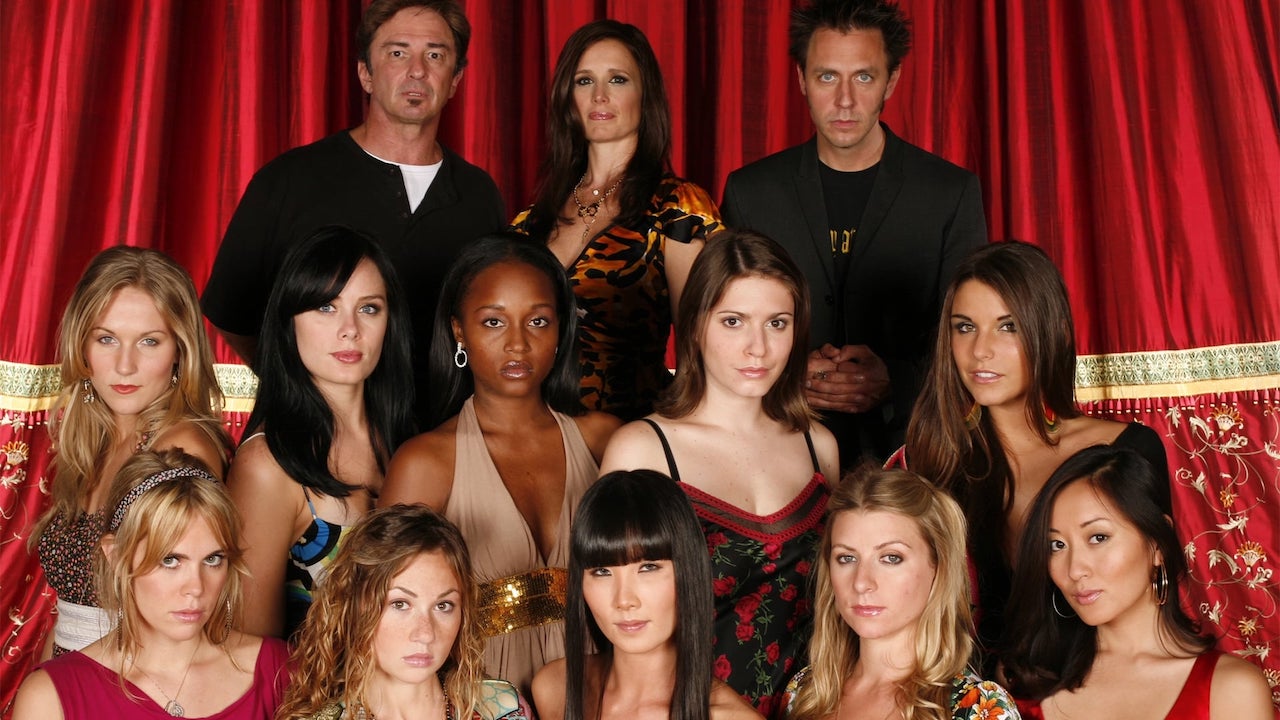There’s a reason you haven’t heard of horror competition series Scream Queens

Horror fan Eliza Janssen races to watch a forgotten reality series with actresses dying (he he he) to become the next horror movie icon. What she finds instead is Scream Queens, an exploitative naughties-era beauty pageant that puts contestants through emotional torture.
How had I never heard of Scream Queens until just now? Across its two seasons released on American network VH1 in 2008 and 2009, the reality series combines my beloved horror genre with the addictive competitive format that keeps me coming back to every single season of the insanely prolific RuPaul’s Drag Race franchise. It follows unknown actresses striving to be crowned Hollywood’s next horror leading lady—read: getting a bit part in Saw VI—in challenges judged by Saw actress Shawnee Smith and Slither director James Gunn.
That guy is, of course, the head of a whole fricking superhero cinematic universe now. But where are all the promising young wannabe scream queens he judges in the show, some of whom won their Saw cameos and went on to do little else of note? The sad truth is that Scream Queens is less a splashy celebration of women in horror and more like a spoopy version of America’s Next Top Model, with the exploitation ramped up to 11 and some buckets of fake blood dumped on it.
Newly available to watch in Australia via Stan, I eagerly dove into season one of Scream Queens, an opening montage quickly teaching me that the ideal ‘scream queen’ must be “vivacious, vulnerable, feminine and bold”. Really? Sigourney Weaver’s Ellen Ripley, frequently touted as the genre’s greatest final girl of all time, was written without any indication of the character’s gender in the Alien script. Gunn and gruff acting coach John Homa quickly follow this up by claiming that “nothing is hotter than a badass scream queen”, and instructing the fledgling Laurie Strodes to “eat a piece of fruit as seductively as possible” for the show’s very first acting challenge. “Looking sexy onscreen is just as important as looking terrified”, Homa sternly tells the women.
By the time one actress wins the pilot episode challenge despite the judges admitting—to her face!!— that she’s “not the hottest lady here in the house”, the explicit cruelty and bodyshaming of Scream Queens can’t be denied. It’s only a matter of time before the contestants internalise that misogyny, quickly getting coded as either mean girls or virtuous goody-goodies. Disturbingly, the women are allowed to enjoy “a night out” in episode three, not knowing they’ll be asked to perform in a scripted challenge once they’re nice and boozed up. Once they’ve already erupted into drunken bickering and sobbing. With one contestant yelling at another, “do you know how ugly and Jewish you look?”
Sozzled strangers ripping each other to shreds is the bread and butter of reality TV. But even in the extremely manipulative and problematic ANTM, the tone was kept light; bitchy, glamorous, as superficial as audiences at the time expected of a televised beauty pageant. Here there’s an unintentionally grim contrast between the ways in which women are gleefully ground up across the horror canon, and in how the show’s leering gaze carves away at its real, aspiring competitors.
The judges and producers of Scream Queens expect their contestants to “give 110%”, “get personal”, “get ugly”, all overshadowed by Shawnee Smith’s warning that most of them “will go back to waiting tables and dreaming about your big break instead of living it”. Jeez! The flimsy promise of genre stardom, bolstered by the grittiness and extremity of horror filmmaking, gives the team behind this little-known competition series an excuse to act like powerful horror villains in their own right, hunting down the most sexy, submissive final girl. Watching it feels like sitting on a creepy basement casting couch for hour after hour, and the show could certainly never be made in the same way today.
Gunn doesn’t come across especially well in the series, casting the women as horny vampires and zombie-fighting schoolgirls in scenes opposite his good buddy Michael Rooker and brother Sean Gunn. Homa is worse, bragging about having made previous star clients cry and objectifying the contestants whenever possible (“I noticed that my mouth was open, is that distracting?”, one half-naked starlet asks during a shoot. “Not to most men”, her supposed mentor chuckles).
At least season one picks the right winner—a relatively untrained hopeful who rails against her fellow participants’ tokenism in one misguided acting exercise. Asked to mimic the winner, the season’s designated Mean Girl spouts off about her wanting to be seen as “that strong black woman who came from the projects”: the winner is infuriated, and copies the Mean Girl in turn, adopting a Valley Girl accent to talk about how “minorities aren’t marketable”.
In such an extremely 2000s series, with all its chunky highlights, gay panic and fatshaming, she’s before her time, and totally correct. Scream Queens isn’t about the horror genre at all, or about rocketing a new talent to star status. It’s about what’s marketable: “the talent, the looks, and the lungs”, as one promo voiceover growls, with the emphasis firmly placed on that middle bit. Nothing may be hotter than a badass scream queen, I’ll give Gunn and the salivating judges that—but the show’s slimy process of making such a star, by breaking her identity down into commercially viable parts, should be enough to make any aspiring Jamie Lee Curtis scream with real terror.














